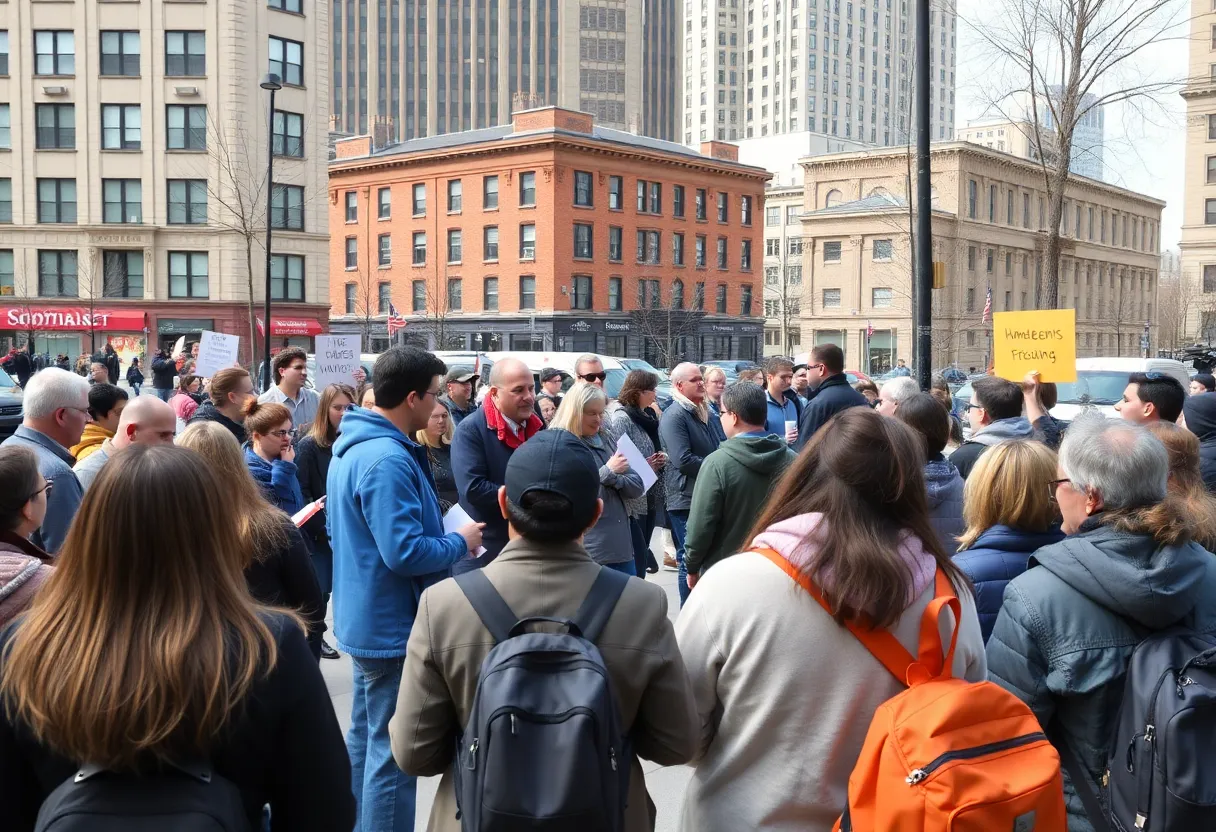News Summary
Orange County is responding to President Trump’s recent executive order concerning homelessness, which emphasizes law enforcement and mandatory treatment. The directive calls for expanded civil commitments and promotes a shift away from ‘housing first’ initiatives towards enforcement strategies. Local officials have expressed mixed reactions, with some supporting enforcement measures while others raise concerns about the potential criminalization of poverty and the future of critical funding for homeless services. As the debate unfolds, advocates are calling for solutions prioritizing care over incarceration.
Orange County Officials Respond to President Trump’s Executive Order on Homelessness
Orange County is grappling with the implications of an executive order signed by President Donald Trump on July 24, which aims to reshape how homelessness is addressed across the United States. The order focuses on law enforcement and mandatory treatment for individuals experiencing homelessness, marking a significant shift in federal policy.
The directive encourages state governments to broaden civil commitments for people with serious mental illness or substance use disorders. Under this new framework, individuals deemed incapable of self-care may be placed into treatment facilities. The order also instructs federal agencies to cut funding for “housing first” initiatives, which have previously prioritized permanent housing solutions for the unhoused. Instead, it seeks to support cities that enforce laws against camping and loitering in public spaces.
The Homelessness Crisis
President Trump attributed the rising homeless population in the U.S. to increasing drug addiction and mental health issues. He referenced statistics indicating that 274,224 individuals were living on the streets during the administration prior to his, a record high. The order does not specifically mention California’s proposed CARE Court but raises questions about its potential ramifications. CARE Court is designed to offer voluntary treatment plans for individuals suffering from serious mental illnesses, indicating a shift away from punitive measures.
Mixed Reactions from Local Officials
In Orange County, responses to the executive order have been mixed. Fifth District Supervisor Katrina Foley expressed partial support for stronger enforcement measures aimed at removing dangerous individuals from public spaces. However, she underscored concerns regarding the transfer of medical information to law enforcement, advocating for the protection of privacy rights.
Meanwhile, Sheriff Don Barnes signaled a willingness to adopt a proactive approach that combines outreach with enforcement strategies, suggesting that additional funding could lead to positive outcomes for homelessness initiatives. On the other hand, Santa Ana Councilmember Johnathan Hernandez cautioned that the shift towards criminalization could result in greater incarceration rates without addressing the fundamental issues surrounding homelessness.
Criticism of the Executive Order
Several local officials, including Vicente Sarmiento, voiced strong opposition to the executive order. They argue that it risks criminalizing poverty rather than providing essential healthcare and housing solutions. Critics also highlight the directive’s focus on criminality instead of alleviating the suffering of unhoused individuals, pointing to a lack of detail regarding implementation.
An independent audit has raised alarms about the lack of accountability in the expenditure of billions allocated for homelessness solutions in California. Experts believe that the president’s executive order could undermine existing practices that have proven effective, forcing service providers to adapt amid potential funding crises brought about by proposed federal cuts.
Concerns Over Future Funding
Local organizations that provide services to the homeless are expressing apprehension about the possibility of losing federal support for harm reduction strategies and permanent supportive housing options. Advocates for unhoused individuals fear that increased funding directed towards law enforcement will detract from the critical healthcare, housing, and social services necessary to address the homelessness crisis comprehensively.
As the fallout from this executive order unfolds, questions remain about the effectiveness of the new approach to homelessness, with many local advocates calling for solutions that prioritize care over incarceration. The mix of support and dissent among Orange County officials reflects the complexity and urgency of addressing homelessness in the current landscape.
Deeper Dive: News & Info About This Topic
HERE Resources
Costa Mesa Expands Behavioral Health Care Program
Newport Beach City Manager Announces Retirement Plans
Irvine Advances Plans for Gateway Preserve and Housing Development
Irvine to Transform Old Asphalt Plant into Gateway Preserve and New Townhomes
Jordan Kirby Announces Candidacy for California’s 72nd Assembly District
Fullerton Man Sentenced for Shooting Incident in Santa Ana
Newport Beach Proposes Snug Harbor Surf Park Development
Costa Mesa Firefighters Combat Industrial Blaze
Orange County Implements Measures to Combat Homelessness
Huntington Beach Father Calls for Understanding After Mistaken Identity Incident
Additional Resources
- OC Register: Trump’s Homelessness Crackdown
- LA Times: Trump Policies Affect Homeless Services
- OC Register: Trump’s Crackdown on Homelessness
- Encyclopedia Britannica: Homelessness
- Daily Gazette: Trump’s Homelessness Crackdown in Orange County

Author: STAFF HERE COSTA MESA WRITER
The COSTA MESA STAFF WRITER represents the experienced team at HERECostaMesa.com, your go-to source for actionable local news and information in Costa Mesa, Orange County, and beyond. Specializing in "news you can use," we cover essential topics like product reviews for personal and business needs, local business directories, politics, real estate trends, neighborhood insights, and state news affecting the area—with deep expertise drawn from years of dedicated reporting and strong community input, including local press releases and business updates. We deliver top reporting on high-value events such as the OC Fair, Concerts in the Park, and Fish Fry. Our coverage extends to key organizations like the Costa Mesa Chamber of Commerce and Boys & Girls Clubs of Central Orange Coast, plus leading businesses in retail, fashion, and technology that power the local economy such as Vans, Experian, and South Coast Plaza. As part of the broader HERE network, including HEREAnaheim.com, HEREBeverlyHills.com, HERECoronado.com, HEREHollywood.com, HEREHuntingtonBeach.com, HERELongBeach.com, HERELosAngeles.com, HEREMissionViejo.com, HERESanDiego.com, and HERESantaAna.com, we provide comprehensive, credible insights into California's dynamic landscape.


